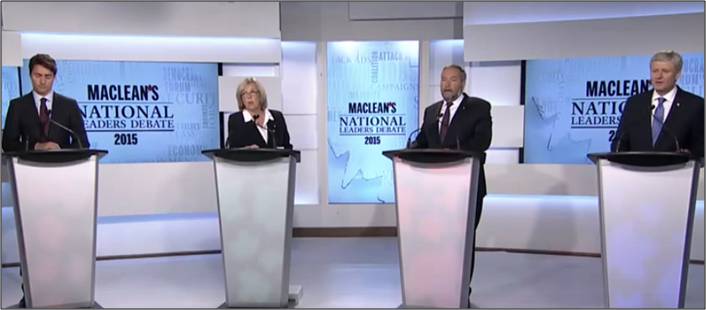Chip in to keep stories like these coming.
Canada will have a national election on October 19. Prime Minister Stephen Harper launched the election campaign on August 2 in the middle of a holiday weekend. He dissolved Parliament and thus began what will be Canada’s longest election campaign in many decades.
The first televised debate of party leaders took place on August 6, hosted by the weekly Maclean’s newsmagazine. Four of the five leaders of the parties represented in Parliament took part.
Foreign affairs occupied only a small part of the debate. Viewers might have expected some attention to NATO’s military buildup in eastern Europe and NATO’s and Canada’s support to the war launched in eastern Ukraine last year by the governing regime in Kyiv. This was not to be. According to the terms of the debate and according to the comments by the four party leaders, Ukraine is a subject best left unspoken.
Moderator Paul Wells of Maclean’s put one question only about Ukraine to only one of the leaders–Tom Mulcair of the New Democratic Party.
The moderator’s one question was odd because he seemed unaware that Ukraine is not a member of the NATO military alliance. He asked Mulcair, “Canada is part of a NATO mission [in Ukraine]. NATO’s Article 5 says if a NATO nation is attacked, all NATO nations must respond. Would an NDP government uphold NATO’s Article 5 in eastern Europe?”
Mulcair began his reply by clarifying that Ukraine is not a NATO member. He then went on, “We [Canada] are proud members of NATO.” Mulcair said support to NATO military actions will be a “cornerstone” of the foreign policy of the NDP if elected.
Mulcair then voiced a tired, anti-Russia refrain. “With regard to Ukraine, yes, Putin is a danger. We stand firmly with Ukraine against the aggression by Russia.”
Reading from a prepared note, Mulcair went on to argue for an even harsher stand against the Russian government and people than that of the avowed, Russia-hating Prime Minister Stephen Harper. Mulcair named two Russian businessmen whom he says Canada should add to its list of Russian businessmen and political leaders targeted for sanctions against travel and financial transactions.
Mulcair returned to his petty point of the two individuals a second time after Harper brushed aside the question.
The NDP is the largest opposition party in Parliament and has a good shot at winning the election. It is a social democratic party supported by trade unions and other progressive social forces in Canada.
Beginning in the 1960s, the NDP had a formal party plank adopted at a party convention in favour of Canadian withdrawal from NATO. But party leaders have never adhered to the policy. It was degraded by successive party leaders and eventually reversed altogether.
Notwithstanding vacuous party leader debates on Ukraine and the NATO offensive in eastern Europe, progressive forces in Canada need to organize to challenge Canada’s support for the war in eastern Ukraine and the related, war-threatening sanctions against Russia.
This is closely tied to another foreign policy imperative — that Canada cease its support to Israel and its harsh policies against the Palestinian people. Canada should, instead, become an advocate of Palestinian national rights and a democratic, secular homeland for Jews and Palestinians alike in the Middle East.
This commentary also appeared on New Cold War; Ukraine and beyond, of which Roger Annis is an editor.
Chip in to keep stories like these coming.



